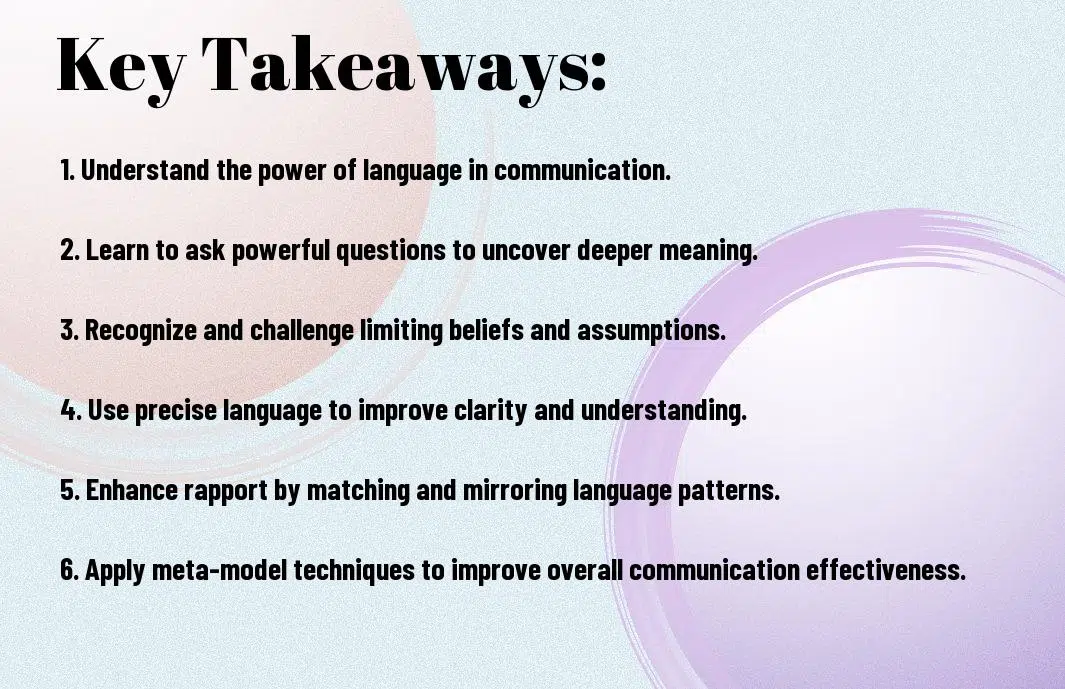Delve into the intricate world of Neuro-Linguistic Programming (NLP) with our comprehensive guide to mastering NLP Meta Models. These advanced techniques are instrumental in enhancing your communication skills, allowing you to effectively convey your thoughts and ideas with precision and clarity. By acquiring a deep understanding of NLP Meta Models, you will not only be able to improve your personal and professional relationships, but also influence others in a positive and impactful manner.
In this blog post, you will learn the key concepts and principles of NLP Meta Models, as well as practical strategies to implement them in your daily interactions. Whether you are a seasoned practitioner of NLP or a novice looking to enhance your communication skills, mastering NLP Meta Models is essential for anyone seeking to excel in their interpersonal interactions. So, buckle up and prepare to transform the way you communicate with others.
Key Takeaways:
- Understanding Meta Models: Mastering NLP Meta Models is crucial for effective communication as it enables individuals to identify and challenge the underlying assumptions and beliefs in language.
- Improving Communication Skills: By mastering NLP Meta Models, individuals can develop the ability to ask precise and targeted questions, leading to clearer and more effective communication.
- Enhancing Rapport and Influence: Utilizing NLP Meta Models allows individuals to establish rapport and influence others by gaining a deeper understanding of their communication patterns and underlying thought processes.
The Foundations of NLP
Any effective study of Neuro-Linguistic Programming (NLP) begins with an understanding of its foundational concepts. NLP is a powerful set of tools and techniques designed to help you understand and leverage the connections between your thoughts, language, and behavior. By mastering the foundational principles of NLP, you can enhance your communication skills and achieve your desired outcomes in both personal and professional interactions.
Brief History of Neuro-Linguistic Programming
Neuro-Linguistic Programming was co-created in the 1970s by Richard Bandler and John Grinder. They studied the language patterns and behaviors of outstanding psychotherapists, such as Fritz Perls (founder of Gestalt therapy), Virginia Satir (known for her work in family therapy), and Milton H. Erickson (a prominent psychiatrist and psychologist). Through their observations and research, Bandler and Grinder sought to identify the key elements that made these therapists exceptionally effective in their work. The result was the development of NLP, a methodology for understanding and replicating the thought and behavior patterns of successful individuals.
Key Principles Behind NLP Practices
One of the key principles behind NLP is the recognition that your subjective experience of the world is not the same as objective reality. This means that your perceptions, beliefs, and interpretations shape your experience, and by understanding and changing these internal processes, you can transform your approach to communication and behavior. Another fundamental principle of NLP is the understanding that people have all the resources they need to make positive changes in their lives. This principle is based on the belief that individuals already possess the internal capabilities necessary for personal growth and development, and by tapping into these resources, you can achieve your desired outcomes.
Understanding the NLP Meta Model
Now that you are diving into the world of NLP, it is crucial to understand the Meta Model and its significance in effective communication. The Meta Model is a set of language patterns and techniques that help to identify and challenge the limitations and distortions in communication. By mastering the Meta Model, you can enhance your ability to communicate more clearly and effectively, as well as gain a deeper understanding of the underlying structure of language.
The Structure of the Meta Model
When diving into the Meta Model, it is essential to understand its structure. The Meta Model is based on three key linguistic concepts: deletion, distortion, and generalization. Deletion involves leaving out important information, distortion involves changing the meaning of the information, and generalization involves applying broad categories to specific situations. By recognizing these linguistic patterns, you can identify where there may be a lack of clarity or accuracy in communication and work towards resolving it.
The Role of the Meta Model in NLP
The Meta Model plays a crucial role in NLP by providing a powerful framework for understanding and improving communication. By using the Meta Model techniques, you can uncover hidden information, challenge assumptions, and clarify vague or ambiguous language. This allows you to gain a more accurate understanding of the other person’s perspective and effectively communicate your own thoughts and ideas. By mastering the Meta Model, you can enhance your ability to influence, persuade, and build rapport with others, ultimately leading to more successful and impactful communication.
Meta Model Techniques
Despite your best efforts, effective communication can often be hindered by the way people use language. NLP meta model techniques can help you to overcome these communication barriers by identifying and challenging distortions, uncovering generalizations and deletions, and clarifying vague language.
Identifying and Challenging Distortions
When someone uses distortions in their language, they are presenting information that is not entirely accurate. This can lead to misunderstandings and miscommunication. By learning to identify and challenge distortions, you can gain a clearer understanding of the information being presented to you. One common distortion is the use of mind reading, where someone assumes they know what another person is thinking or feeling without any evidence. By challenging this distortion, you can encourage the other person to express themselves more clearly.
Another common distortion is the use of cause and effect statements without supporting evidence. For example, someone might say “I feel anxious because of the presentation.” By challenging this statement, you can encourage the person to explore the actual cause of their anxiety and gain a deeper understanding of their own emotions.
Uncovering Generalizations and Deletions
Generalizations and deletions can also hinder effective communication. When someone uses language that is overly general or omits important details, it can be difficult to fully understand their message. By uncovering generalizations and deletions, you can encourage the speaker to provide more specific and detailed information, leading to clearer communication and a deeper understanding of the topic at hand. It’s important to challenge generalizations such as “Everyone thinks that” or “No one ever.” By doing so, you can highlight the dangerous and inaccurate nature of such sweeping statements.
Similarly, when someone uses deletions in their language, they are leaving out important information that can impact understanding. By pointing out and challenging these omissions, you can ensure that you have a complete picture of the topic under discussion, ultimately leading to more effective communication.
Practical Applications of the Meta Model
After mastering the NLP Meta Model, you can apply the techniques in various real-life situations to enhance communication and influence others effectively. In this chapter, we will explore practical applications of the Meta Model that you can implement in your daily interactions to achieve better clarity and rapport with others.
Enhancing Clarity in Communication
One practical application of the Meta Model is enhancing clarity in communication. By using the Meta Model techniques such as challenging generalizations, deletions, and distortions, you can encourage others to provide more specific and detailed information. This can help you gain a better understanding of their thoughts, emotions, and intentions. By asking precise questions and seeking clarity, you can ensure that there is no room for misunderstanding or miscommunication during conversations.
Building Rapport and Influencing Others
Another practical application of the Meta Model is building rapport and influencing others. By using the Meta Model techniques to elicit more information and understand the underlying meanings in communication, you can build stronger connections with others. This can help you establish trust, empathy, and understanding, which are essential components of effective communication and influence. Additionally, by using the Meta Model to challenge limiting beliefs and language patterns, you can positively influence others and help them overcome obstacles or negative thought patterns.
Advanced Meta Model Strategies
Unlike the basic Meta Model techniques, advanced strategies involve deeper analysis and understanding of language patterns to uncover more implicit meanings and assumptions. Here are some advanced Meta Model strategies that you can implement to enhance your communication skills:
- Utilizing presuppositions effectively
- Identifying and challenging complex equivalence
- Exploring cause-effect relationships
- Uncovering comparative deletions
Implementing these strategies requires a nuanced understanding of language structures and the ability to identify subtle patterns in communication. This can be achieved through practice and honing your skills in linguistic analysis.
Table: Advanced Meta Model Strategies
| Strategy | Description |
| Utilizing presuppositions effectively | Identifying and leveraging the hidden assumptions within a conversation to gain deeper insights. |
| Identifying and challenging complex equivalence | Recognizing when two different things are being equated and challenging the validity of this equivalence. |
| Exploring cause-effect relationships | Analyzing the causal connections implied in statements to uncover implicit meanings and motivations. |
| Uncovering comparative deletions | Identifying and addressing the omissions of comparative information in language to elucidate the intended message. |
Utilizing Meta Model Patterns in Coaching and Therapy
When coaching or conducting therapy sessions, applying Meta Model patterns can greatly enhance your ability to uncover underlying beliefs and thought processes. By utilizing the Meta Model, you can help your clients explore and challenge their limiting beliefs, uncovering deeper layers of meaning in their communication. This can lead to breakthroughs and facilitate personal growth and development. Additionally, by understanding and addressing the underlying language patterns, you can guide your clients towards more effective and positive ways of thinking and communicating.
Meta Model Interventions for Conflict Resolution
Conflict resolution often involves navigating through communication barriers and addressing underlying misunderstandings. By utilizing Meta Model interventions, you can effectively identify and challenge the language patterns that contribute to conflicts. This can help in clarifying misconceptions, improving understanding, and facilitating constructive dialogue. By addressing the implicit assumptions and presuppositions in communication, you can guide the conflicting parties towards a more harmonious and mutually beneficial resolution. This approach can be particularly powerful in managing and resolving conflicts within professional or personal relationships.
Overcoming Obstacles with Meta Model
Not everyone you communicate with will be receptive to the techniques of NLP Meta Model. People may have preconceived notions or resistance to change, which can hinder effective communication. However, when you encounter these obstacles, you can overcome them by applying specific strategies tailored to the situation and the individual you are conversing with.
Anticipating and Addressing Resistance
When you encounter resistance during a conversation, it’s essential to recognize it and address it effectively. People may resist by dismissing your ideas, changing the subject, or becoming defensive. To overcome this, you can acknowledge their viewpoint, listen actively, and use reframing techniques to guide the conversation towards a more constructive path. By validating their concerns and offering alternative perspectives, you can break down resistance and establish a more open communication channel.
Adapting the Meta Model to Different Personalities and Contexts
Adapting the NLP Meta Model to different personalities and contexts is crucial for effective communication. No two individuals are alike, and each person may respond differently to your communication approach. By understanding the personality traits, preferences, and communication styles of the person you are interacting with, you can tailor your language patterns, questioning techniques, and pacing to match their needs and preferences. This adaptability will help you establish rapport, build trust, and convey your message more effectively in various social and professional settings.
Keep in mind that not everyone will readily embrace the techniques of the NLP Meta Model. By anticipating and addressing resistance, and adapting your approach to different personalities and contexts, you can navigate through these obstacles and optimize your communication for successful outcomes. Your ability to apply the Meta Model effectively in various situations will significantly enhance your communication skills and interpersonal relationships.
Integrating Meta Model Techniques into Everyday Life
For you to truly master NLP meta model techniques, it is crucial to integrate them into your everyday life. This means practicing and habituating these techniques, continuously developing your skills, and recognizing the impact they have on your communication and personal growth.
Practice and Habituation of Meta Model Questions
Consistent practice is key in embedding meta model techniques into your daily interactions. You can start by consciously incorporating meta model questions in your conversations, whether it’s in professional settings, social gatherings, or even in your personal relationships. By consistently utilizing these techniques, you will start to internalize them and make them a natural part of your communication style.
Creating the habit of asking meta model questions also helps to enhance your listening skills and deepen your understanding of others. As you make a conscious effort to practice and habituate these techniques, you will notice a significant improvement in the quality of your interactions and the effectiveness of your communication.
Continuous Personal Development through Meta Model Mastery
Mastering NLP meta model techniques goes beyond just the basic understanding and application. It involves a continuous journey of personal development through the mastery of these techniques. By continually refining your skills and expanding your knowledge of the meta model, you will become more adept at identifying and addressing communication barriers and limitations in both yourself and others.
Embracing this journey of continuous personal development through meta model mastery will not only improve your communication but also contribute to your overall growth and self-awareness. It will empower you to navigate through challenging communication scenarios with confidence and clarity.
Summary of Key Takeaways
As you integrate NLP meta model techniques into your everyday life, it is important to remember the key takeaways. Consistent practice and habituation of meta model questions are essential for internalizing these techniques. By continuously developing your skills, you will enhance your understanding and application of the meta model, leading to personal and professional growth.
The Future of NLP Meta Model in Communication Skills Development
The future of NLP meta model in communication skills development is promising. As you continue to incorporate these techniques into your daily life, you will not only see a significant improvement in your ability to communicate effectively, but also experience personal transformation. The ongoing advancement and application of the meta model will positively impact your interactions and relationships, ultimately shaping the way you communicate and connect with others.
FAQ
Q: What are NLP Meta Models?
A: NLP Meta Models are linguistic models and techniques used for analyzing and improving communication. These models help individuals understand the language patterns and underlying thinking processes of others, and provide strategies for effective communication.
Q: How can mastering NLP Meta Models enhance communication skills?
A: By mastering NLP Meta Models, individuals can improve their ability to understand and decode hidden messages, gain deeper insights into how others think and process information, and learn to ask targeted questions to clarify and reframe communication. This leads to more effective and persuasive communication in both personal and professional settings.
Q: What are some techniques for mastering NLP Meta Models?
A: Techniques for mastering NLP Meta Models include learning to recognize and interpret language patterns, practicing active listening to identify underlying beliefs and assumptions, using sensory-based language to enhance rapport and influence, and employing precision questioning to uncover and address communication gaps. These techniques can be learned and applied through training, coaching, and continuous practice.




